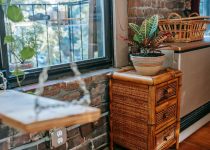What Can I Use for Patio Other Than Pavers
Are you looking for alternative options for your patio besides traditional pavers? Well, you’re in luck! In this article, we’ll explore various materials that you can use to create a stunning patio.
From natural stone and concrete slabs to wood decking and artificial turf, there are plenty of choices available. So, whether you want a rustic or modern look, we’ve got you covered.
Say goodbye to pavers and hello to a patio that reflects your unique style and taste.
Table of Contents
Key Takeaways
- There are various patio material options other than pavers, including natural stone, concrete slabs, wood decking, gravel, rubber flooring, interlocking tiles, and decomposed granite.
- Low maintenance alternatives to traditional pavers include synthetic grass, composite decking, rubber flooring, and interlocking tiles.
- Natural stone offers benefits such as natural beauty, durability, low maintenance, and versatile design options, but it can be more expensive and require professional installation.
- Patio tile options include porcelain tiles, ceramic tiles, and natural stone tiles, and proper surface preparation is essential for their installation using adhesive or mortar with grout filling the gaps.
Natural Stone
If you’re looking for alternatives to pavers, natural stone is a great option for your patio. Natural stone alternatives offer numerous benefits that make them an attractive choice.
First and foremost, natural stone is incredibly durable and long-lasting. It can withstand heavy foot traffic, extreme weather conditions, and the test of time.
Additionally, natural stone adds a touch of elegance and sophistication to any outdoor space. Its natural beauty and unique patterns create a visually appealing environment.
Another advantage of using natural stone is its low maintenance requirements. Unlike pavers, which may require regular cleaning and sealing, natural stone only needs occasional sweeping and rinsing.
Lastly, natural stone is available in a variety of colors and textures, allowing you to personalize your patio to suit your style and preferences.
Concrete Slabs
Consider using concrete slabs as an alternative for your patio instead of pavers. Concrete slabs offer several pros and cons compared to pavers.
One advantage is the cost. Concrete slabs are generally more affordable than pavers, making them a budget-friendly option. Additionally, concrete slabs are durable and require minimal maintenance. They can withstand heavy foot traffic, extreme weather conditions, and are resistant to cracking.
On the downside, concrete slabs may not offer as much design flexibility as pavers. Pavers come in a variety of shapes, colors, and patterns, allowing for more customization. However, concrete slabs can still be aesthetically pleasing with various finishes and textures.
Ultimately, when considering the cost comparison and durability, concrete slabs can be a practical choice for your patio.
Wood Decking
Maintaining a wood deck requires regular cleaning and sealing to keep it looking its best. Wood decking is a popular choice for outdoor patios due to its natural beauty and durability. Here are four reasons why wood decking may be the perfect option for your patio:
-
Warm and inviting: The natural warmth and beauty of wood create a cozy and inviting atmosphere for your outdoor space.
-
Versatile design: Wood decking can be customized to match any style or aesthetic, offering endless design possibilities.
-
Comfortable underfoot: Unlike hard and cold surfaces like tile, wood decking provides a comfortable and cushioned feel when walked on.
-
Easy installation: Wood decking is relatively easy to install, making it a convenient choice for DIY enthusiasts.
Consider wood decking as a versatile and attractive alternative to traditional patio materials like tile. With proper care and maintenance, your wood deck will provide years of enjoyment and enhance the overall appeal of your outdoor space.
Gravel
Gravel is an affordable and versatile option for your patio. It is easy to install, requiring minimal effort and time.
Additionally, gravel is a low maintenance alternative that does not require regular upkeep or sealing like other patio materials.
Affordable and Versatile Option
An affordable and versatile option for your patio could be using concrete pavers. Here are a few reasons why they can be a great choice:
-
Cheaper alternatives: Concrete pavers are more cost-effective compared to other patio materials like natural stone or brick.
-
DIY options: Concrete pavers are easy to install, making them a perfect choice for those who enjoy DIY projects.
-
Durable and low maintenance: Concrete pavers are known for their durability and resistance to harsh weather conditions. They require minimal maintenance, saving you time and effort.
-
Design flexibility: Concrete pavers come in a variety of shapes, sizes, and colors, allowing you to create unique patterns and designs for your patio.
Overall, using concrete pavers for your patio is a budget-friendly and customizable option that you can easily install yourself.
Easy to Install
Concrete pavers are a breeze to install, making them a popular choice for DIY enthusiasts.
However, if you’re looking for an alternative to pavers for your patio, consider rubber flooring or interlocking tiles.
Rubber flooring is a durable and versatile option that provides excellent cushioning and is resistant to wear and tear. It comes in various colors and patterns, allowing you to create a unique and stylish outdoor space.
Interlocking tiles, on the other hand, offer a quick and easy installation process. These tiles simply snap together, eliminating the need for any adhesive or special tools. They come in different materials, such as wood, stone, or composite, giving you a wide range of options to choose from.
Whether you prefer the flexibility of rubber flooring or the simplicity of interlocking tiles, both options provide a hassle-free solution for your patio needs.
Low Maintenance Alternative
If you’re looking for a low-maintenance alternative for your outdoor space, consider rubber flooring or interlocking tiles. These options provide durability and ease of maintenance, allowing you to spend more time enjoying your patio and less time on upkeep.
Here are some reasons why these alternatives are worth considering:
-
Synthetic grass: With synthetic grass, you can enjoy the look and feel of a green lawn without the hassle of mowing, watering, or fertilizing. It stays vibrant and lush all year round, requiring minimal maintenance.
-
Composite decking: Composite decking offers the appearance of wood without the need for staining or sealing. It is resistant to rot, fading, and warping, making it an ideal choice for outdoor spaces that endure harsh weather conditions.
-
Rubber flooring: Rubber flooring is highly durable and resistant to stains, mold, and mildew. It provides a comfortable surface for walking and is easy to clean with just soap and water.
-
Interlocking tiles: Interlocking tiles are a versatile option that allows for easy installation and customization. They come in various styles and colors, offering endless design possibilities for your patio.
Decomposed Granite
If you’re considering using decomposed granite for your patio, it’s important to weigh the pros and cons.
One advantage of decomposed granite is its natural appearance and ability to create a rustic, earthy look.
However, it’s important to note that decomposed granite can be more difficult to install compared to other materials.
Additionally, it’s crucial to consider the cost comparison between decomposed granite and alternative patio materials to ensure it fits within your budget.
Pros and Cons
One option you can consider for your patio, besides pavers, is using natural stone, which has its own set of pros and cons. Here are some things to consider about using natural stone for your patio:
-
Pros:
-
Natural beauty and unique patterns that add character to your outdoor space
-
Durable and long-lasting, able to withstand weather elements
-
Low maintenance, requiring minimal cleaning and upkeep
-
Versatile in terms of design options, allowing for various styles and layouts
-
Cons:
-
Higher cost compared to other patio materials
-
Installation process can be labor-intensive and time-consuming
-
May require professional installation for proper placement and stability
-
Some types of natural stone may be prone to cracking or chipping over time
Overall, using natural stone for your patio can create a stunning and timeless look, but it’s important to weigh the pros and cons before making a decision.
Installation Process
The installation process for natural stone can be labor-intensive and time-consuming. However, the end result is a stunning and durable patio surface that can enhance the beauty of your outdoor space. When it comes to cost estimation, the price can vary depending on factors such as the type of stone, labor costs, and any additional materials needed. It is best to consult with a professional to get an accurate estimate for your specific project. In terms of design options, natural stone offers a wide range of choices. From classic flagstone to sleek granite, there is a stone that can complement any aesthetic. Consider factors such as color, texture, and pattern to create the perfect patio design for your home.
| Type of Stone | Cost per Square Foot | Installation Difficulty |
|---|---|---|
| Flagstone | $15-$25 | Moderate |
| Slate | $20-$30 | Moderate |
| Granite | $30-$40 | Difficult |
Cost Comparison
When comparing the cost per square foot of different types of stone, granite is the most expensive option. However, it is important to consider the durability and long-term value of the materials when making a cost analysis.
Here is a comparison of different stone options for your patio:
-
Granite: Expensive, but offers unmatched durability and a luxurious appearance.
-
Limestone: Moderately priced, with a range of colors and textures, but may require more maintenance.
-
Sandstone: Affordable and versatile, but can be prone to cracking over time.
-
Flagstone: Relatively inexpensive, with a natural, rustic look, but may require regular sealing to maintain its appearance.
Tile
You can use tile for your patio instead of pavers. Tile offers a variety of options that can enhance the aesthetic appeal of your outdoor space.
There are different types of tiles available, including porcelain, ceramic, and natural stone. Porcelain tiles are durable, low-maintenance, and resistant to stains and moisture. Ceramic tiles are affordable and come in various colors and patterns. Natural stone tiles, such as slate or travertine, provide a rustic and timeless look.
When it comes to installation, it is important to prepare the surface properly, ensuring it is level and stable. The tiles can then be laid using adhesive or mortar. Grout is used to fill the gaps between the tiles, providing a finished and polished look.
Overall, tile installation for your patio is a versatile and stylish choice.
Stamped Concrete
Stamped concrete offers a cost-effective and durable alternative for your outdoor space. With a wide range of design options, you can create a unique and personalized patio that suits your style and preferences.
Here are some reasons why stamped concrete is a great choice for your outdoor space:
-
Versatility: Stamped concrete can mimic the look of various materials like stone, brick, and wood, giving you endless design possibilities.
-
Durability: This material is built to last, with the ability to withstand heavy foot traffic, extreme weather conditions, and regular use without losing its appeal.
-
Easy maintenance: Unlike other outdoor flooring options, stamped concrete requires minimal maintenance. Just regular cleaning and sealing will keep it looking fresh and new.
-
Cost-effectiveness: Stamped concrete is a more affordable alternative compared to materials like natural stone or pavers, making it a budget-friendly option for your patio project.
Artificial Turf
If you’re looking for a low-maintenance and eco-friendly option for your outdoor space, artificial turf is a great choice.
Not only is it cost effective, but it also has a minimal environmental impact.
Unlike natural grass, artificial turf doesn’t require regular watering, mowing, or fertilizing, which can save you money on water bills and lawn care products.
It is also durable and long-lasting, so you won’t have to worry about replacing it frequently.
In terms of environmental impact, artificial turf eliminates the need for harmful pesticides and reduces water consumption.
Additionally, it doesn’t produce carbon emissions from mowers or require the use of gasoline.
Overall, artificial turf is a practical and environmentally friendly solution for your patio.
Frequently Asked Questions
Can I Use Patio Furniture on Natural Stone or Will It Damage the Surface?
Yes, you can use patio furniture on natural stone without damaging the surface. The stone provides a stable and durable foundation for your furniture. It’s a great alternative to grass, which may cause furniture to sink.
How Do I Prevent Weeds From Growing Between Concrete Slabs on My Patio?
To prevent weed growth between concrete slabs on your patio, consider using alternative patio materials such as gravel or mulch. These options can help create a barrier that inhibits weed growth and requires less maintenance.
Is Wood Decking Suitable for Areas With High Rainfall or Humidity?
Wood decking can be suitable for high rainfall or humidity areas, but it requires regular maintenance to prevent rot and decay. Alternatively, you can consider using alternative materials like composite decking or concrete for your patio.
Can Gravel Be Used as a Permanent Patio Surface, or Is It Only Suitable for Temporary Use?
Gravel can be a low-cost patio option, but it may not be suitable for permanent use. Consider alternative materials like concrete or flagstone for a more durable and long-lasting patio surface.
What Is the Best Way to Clean and Maintain a Tile Patio Surface?
To keep your tile patio clean, start by choosing the right cleaning products. Use a mild detergent and avoid abrasive cleaners. Regularly sweep or vacuum the surface and wipe up spills immediately to prevent stains.



